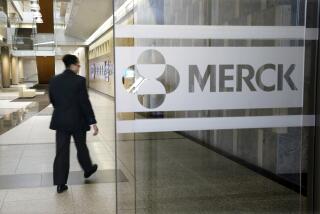Merck Earnings Decline as Generics Squeeze Sales
- Share via
Merck & Co., once a juggernaut among pharmaceutical companies, announced its first decline in quarterly earnings in nearly nine years Thursday, a day after Pfizer Inc. and Bristol-Myers Squibb Co. released disappointing forecasts for 2002. Schering-Plough Corp. reported increased profit on rising sales of hepatitis medications.
Meanwhile, pressure on drug industry profits intensified as AARP, an advocacy group for Americans age 55 and older, said it began a national campaign to urge its 35million members to use generic drugs more often and be wary of ads for brand-name medicines.
The group said it will spend $10million on television and print ads telling consumers that generic medicines, which are usually less expensive, may work as well as more expensive brand-name drugs. The ads also warn patients not to “let advertising sell you on drugs you don’t need.”
Analysts said the industry’s worsening profit outlook reflects the fact that the drug business, despite its good long-term fundamentals, remains cyclical and that its peaks and troughs have become more extreme in recent years.
Nevertheless, analysts predict huge growth in pharmaceutical sales as the nation’s enormous baby boomer generation ages and seeks ways to remain active.
“New products are the lifeblood of the industry, which is prone to cycles,” said Viren Mehta, managing member of Mehta Partners in New York. “Pfizer, Novartis, Pharmacia and others like them have products that are in a growth phase. Merck, Schering-Plough and Bristol-Myers Squibb at the moment are in a down cycle.”
Mehta added that no pharmaceutical company has managed to avoid the cycle of highs and lows.
First-quarter net income for Merck, the nation’s second-largest drug maker, fell 1.9% to $1.63 billion from $1.66 billion. Earnings per share remained at 71 cents. Sales rose 7.3% to $12.2 billion.
Although sales for the Whitehaven, N.J., firm rose on the strength of its Zocor cholesterol drug and Vioxx painkiller, they were not nearly enough to make up for the falloff in earnings for former blockbuster drugs such as heartburn drug Pepcid that now face steep competition from generics.
The news for Schering-Plough was somewhat better as net income climbed 6.4% to $600 million, or 41 cents a share, from $564 million, or 38 cents, a year earlier, as sales increased 11% to $2.56 billion.
Share prices for both companies improved Thursday, but Merck and Schering-Plough’s stock prices are still down 29% and 21%, respectively, over the last year. Merck rose $1.52 to $56.57, and Schering-Plough rose $1.28 to $30.54, both on the New York Stock Exchange.
Pfizer, the largest U.S. drug maker, reported Wednesday that surging sales of key drugs Lipitor and Viagra boosted first-quarter profit 22%, but it cautioned against expectation of double-digit growth for the rest of the year.
Rising costs have hit the industry hard, experts said. But more important, generics now exact a much greater and quicker toll on the earnings of companies that depend on patented drugs.
“Previously, you could assume that 50% of revenues would be lost to generic competition after a drug went off patent. Now, we are seeing 90% losses,” said Trevor Polischuk, a pharmaceutical industry analyst for Lehman Bros.
Polischuk said that 10 to 15 years ago a blockbuster drug might have brought in $750 million over its life, but that revenue streams have become so great for drugs such as Claritin (about $3 billion) and Prilosec (about $6 billion) that the financial effect is that much greater when patents expire.
The bottom line for the industry, however, is that it is headed toward “a whole mess of good news--and bad news for the payers as money spent on pharmaceuticals should double in the next five to six years,” said Mike Jacobs of Mercer Human Resource Consulting. “Someone has to pay for it.”
More to Read
Inside the business of entertainment
The Wide Shot brings you news, analysis and insights on everything from streaming wars to production — and what it all means for the future.
You may occasionally receive promotional content from the Los Angeles Times.











